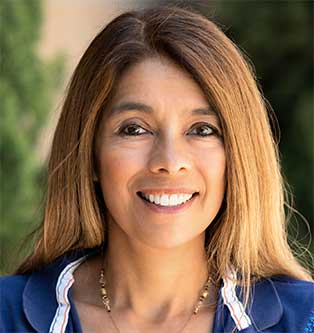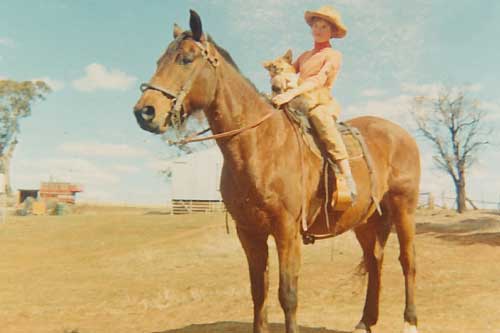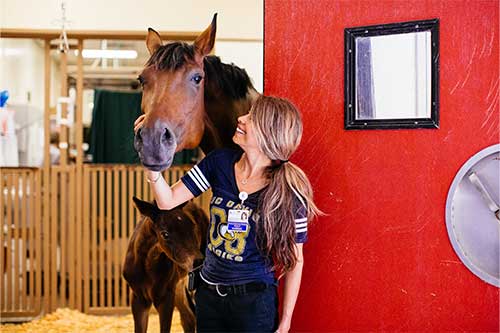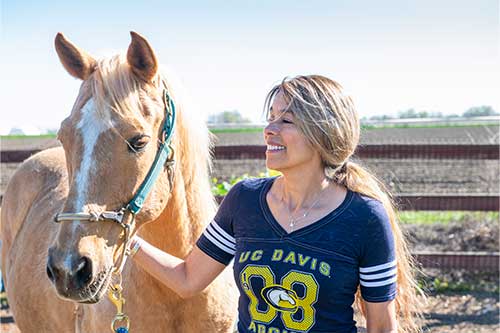Monica Aleman

"Exactly where she wants to be" is how Equine Veterinary Neurologist Dr. Monica Aleman, MVZ, PhD, DACVIM - Internal Medicine & Neurology describes her career. After growing up and attending veterinary school in Mexico, Monica completed a residency in equine internal medicine at UC Davis, followed by a PhD and a second residency in neurology years later. Knowing she wanted to be a veterinarian from a very young age, Monica finds that continuing to learn and practice veterinary medicine helps keep her young, since she still learns something new every day! Empathetic, kind, and dedicated to her patients, Monica credits her loving parents as her first mentors. She considers the issues of mental health and addressing compassion fatigue in veterinary medicine as some of the most pressing issues our profession faces. We agree, and were grateful to Monica for her time reflecting on her career path, some of the challenges she has faced, and what she has planned for the future.
Veterinary School & Year Graduated: Universidad Nacional Autónoma de México, 1991
Additional Degree: PhD, UC Davis, Comparative Pathology, 2004
Questions and Answers
- Tell me about your most challenging and rewarding veterinary jobs or work experiences.
-
The most challenging part is wanting to help every single animal and every single family, but that’s not possible. This is especially true in parts of the world where animals create the family’s way of life. My own father, for example, was very poor. His family depended on a donkey for their livelihood. It was a working animal. When I travel and see animals in other countries, I see my dad with his family and his little donkey. You want to do the best you can for the animal because you know a whole family is depending on that animal and it’s really difficult when you can’t do everything to help the animal. You can have all the will in the world to help, but if the finances and facilities aren’t there, it can be extremely difficult.
The most rewarding part of my work is when I do get to help. Whether it is a companion or working animal, being able to help and make a difference is always wonderful. For example, early in my career after finishing a limited status residency at UC Davis, I went back to Mexico and saw my first case. It was a very young potential dressage horse. The horse was very ill, had a colic surgery, and developed several complications, including a hernia and renal failure. I had just learned so much at Davis and wanted to do everything I could to help this horse. I essentially lived in the horse’s stall for two weeks until he was able to go home. The horse was doing better but he still had a huge scar on his abdomen from the colic surgery and everyone thought that his career was over. Time carried on and I eventually got accepted into a real residency at Davis. While I was at Davis, I was invited to be a veterinarian at the Pan American Games. Someone came and grabbed me and took me to see the horse I had treated years ago in Mexico. He had gone on to earn second place at the Pan American Games. I could not believe my eyes that the horse who had almost died went on to have such an outstanding career. - What did you love about the position or experience?
- I love helping the animals and the fact that I get to learn everyday. You learn every day you do something in veterinary medicine.. It keeps you young, in a sense, because you're learning all the time. You learn from your own experience, you can share your knowledge with others. You and your brain are challenged every day. There's something unique about each case.
- Tell me about your journey to get to that point in your life.
- My journey started by being raised by a loving, caring family. My parents were very great and got me pet birds and a puppy. I had the privilege of meeting my first veterinarian for my puppy when I was six. The veterinarian had a very strong impact on me and was very caring and kind and took the time to explain everything to me, even when my puppy had to be euthanized. I already knew that I wanted to be a veterinarian and that experience solidified it. I realized I wanted to work with horses after reading Black Beauty. I went to vet school in Mexico, which was very challenging at the time because I was one of the only women. It was also challenging trying to break into the equine world considering that I didn't have horses and I wasn’t rich. I had to keep telling myself that I could do it, and I did it! As soon as I was presented with an opportunity to learn in the United States, I took it. My university in Mexico had a good relationship with UC Davis and I decided to apply for a limited status residency. I wanted to learn even more at UC Davis so I later applied for a residency in internal medicine and I learned a lot. I got hired at UC Davis as a staff veterinarian and did that for a year, mostly training residents.
Eventually I wanted to learn more, specifically about neurological disease in large animals. Neurological disease is fairly common in large animals, but at the time the most common treatment was euthanasia. There wasn’t much work on prevention and medical treatment. I couldn’t understand why there were so many small animal neurologists but none for large animals.I started a PhD in neurology at UC Davis with amazing mentors and I really loved the research and we made some great discoveries. After my PhD, I came back to work as a faculty member in equine medicine, but I still felt like I needed more specialized training. That's what led me to do a residency in small animal neurology and neurosurgery. I had to leave my faculty position and give up horses for three years. I was back on a resident salary and on-call every night. People thought that I was crazy, I was almost twice the age of some of the other residents. It was the best decision of my career. People also thought that I was going to stay in small animal medicine. As soon as I finished my residency, I returned to working with large animals. Now, I'm living a dream. I am exactly where I want to be and helping how I want to help. - As a veterinary student, did you ever imagine yourself taking this journey and having these professional experiences?
- Not to this extent. I'm a big dreamer, but I never imagined this. I have to pinch myself sometimes to realize that this is my life. Sometimes it feels too good to be true. Just getting to learn and train at UC Davis seemed impossible to me when I was younger. Then to be hired as faculty and be one of the only large animal neurologists in the world, I still can’t believe it. It’s so much greater than I ever could have imagined.
- In retrospect, what do you wish you’d known as a veterinary student or early in your career?
- I wish I had known more about compassion fatigue. The rate of suicide in our profession is concerning and it is increasing. That worries me a lot. I have been very happy with my career but it saddens me to know that so many veterinarians are struggling. I hope that more veterinary programs can incorporate more awareness about compassion fatigue because this is happening to people that care a lot. Right now I am doing a lot of work with animals burned in wildfires and it is very hard to help these animals because they are suffering so much. I also wish that there was more education surrounding euthanasia when I was in school. I would have loved to have a little bit more preparation on that. I talk to the students here and they tell me that there are more conversations about compassion fatigue and euthanasia so I think we are moving in the right direction and preparing students well.
- Would you have changed anything about your time in veterinary school?
- I wouldn’t change much. All of the events in my career allowed me to get where I am right now and I love what I do. Passion has always been my driving force and I would do it all over again if I could. The only thing that I would change is getting exposure to research while still in school. I had no idea what research was in veterinary school. It wasn’t until I came to Davis and started my PhD that I realized how much I love research and how it is the basis for everything.
- Would you have changed anything about your time since graduating veterinary school?
- I would have loved to do even more research. Don't get me wrong, I love clinical work, but I really love research. In the clinic you usually help one animal at a time, which is essential. But with research, the impact is reaching a lot more animals. I hope to do more research in the rest of my career to benefit more animals and humans. On a similar note, I wish that I had more research mentors. I have a lot of great clinical mentors but I could use more mentors in research.
- Did you have any mentors or role models along the way that helped or inspired you? Please provide an example of how they helped you or what qualities they had that made them a good mentor? How did you find them?
- My first mentors came before vet school, my parents. They are both inspiring, hard working, and so supportive. I feel very lucky to have them. Without them, none of this would be possible. I have several mentors that were critical in my career. My mentors have become my friends and feel like part of my extended family in a way. They are people that care about you, your overall well being, and of course your success. They're the people that believe in you. A lot of the individual success comes from yourself, but mentors also play a big role. I have found mentors just by talking to people about the things that interest me. Usually, if someone is able to make the time to talk to you, that is a good sign.
- Tell me about any pivotal moments or key turning points that shaped your career.
- Doing the residency in small animal neurology opened my eyes to the possibilities I have as a clinician and really improved my skill set for managing neurological cases in horses. Another pivotal moment was my puppy getting euthanized as a child. I asked my veterinarian if my puppy could feel anything when he was being euthanized and the doctor said that he couldn't. I asked how he knew that and the vet didn’t have an answer. From that moment I made a promise to my puppy to understand the events of euthanasia and learn how it affects consciousness. With the knowledge I gained in my neurology residency, I was able to conduct research to describe the order of events in equine euthansia using brainwave monitoring studies.
- Tell me about one or two challenges, setbacks or obstacles that you faced along the way on your professional journey. How did you address those?
- Being a woman in a male-dominated field was challenging, especially in vet school and early in my career. I was often excluded from certain study groups and clients would not think that I was the doctor. Being from Latin America and working in a foreign language also added challenges and made things a little harder.
- What was the most important lesson you learned as a veterinarian, and still remember today, and would want to tell vet students about.
- Always be kind. You never know the impact of your words and your actions on another person.
- What’s been the biggest highlight of your career so far?
- When somebody tells me that they want to be a veterinarian because of me, that is the highest compliment.
- Is there anything else you’d like to tell me that you think would be helpful or relevant to veterinary students or early career veterinarians?
- Dream big, but then put your dream into action. Remember that if you love what you do, you’ll never work a day in your life.



